Wondering if it is better to rent or buy a house? Do you want to know the pros and cons of buying a home vs. renting an apartment?
Where someone calls home is often considered a sacred space. It’s where you can relax, unwind, and enjoy feeling comfortable.
Home is also where you can reflect on your personal style and create a place just for you.
When determining where you want to live, you’ve likely considered the two most popular options — buying a home vs. renting an apartment. There are so many factors to consider like local real estate market, home value over time, homeowners insurance, rate mortgage, and more.
Your choice to rent or own comes down to more than just what you can afford.
While both choices have pros and cons, it’s essential to determine which one better fits your needs.
So how do you decide between buying a home vs. renting an apartment? Let’s find out.

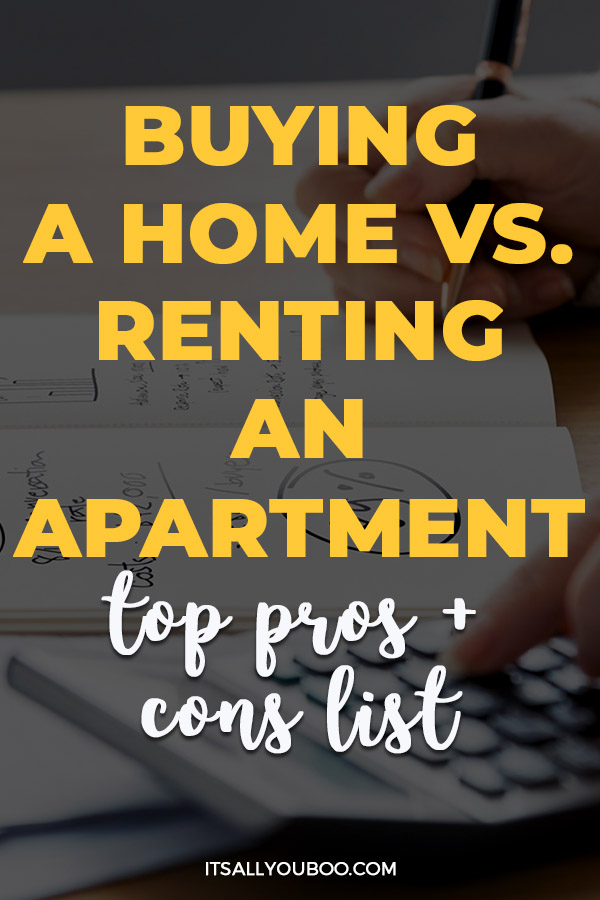
THIS POST MAY CONTAIN AFFILIATE LINKS.
IF YOU MAKE A PURCHASE FROM THESE LINKS, I MAY EARN A SMALL COMMISSION.
CLICK HERE FOR MY FULL DISCLAIMER STATEMENT.
Which Is Better? Buying a Home vs. Renting an Apartment?
The truth is there’s no real answer to this question. For some people, renting may be a better option. For others, buying may better suit their needs. The answer is really up for debate depending on your personal goals for your living situation.
There are a lot of contributing factors that go into this decision in buying a house vs. renting an apartment. You will need to look over your finances, credit scores, credit cards, student loans, auto loans, and tax benefits to see what you can afford. First, set a SMART financial goal for yourself.
Other factors such as pets, hobbies, and family size can also play a role in determining which choice is better for you.
Taking all these factors into consideration will help guide you to decide whether renting versus buying property is best for you. Here is a comprehensive list of pros and cons.
Pros of Renting An Apartment
It can be a common thought that renting is worse than buying, so you may wonder if there is a benefit in renting as opposed to owning a home. There are a lot of factors that come to play when deciding to buy a home vs. renting an apartment.
But there are many reasons why buying is better than renting, and there are many situations where renting makes more sense.
👉🏽 RELATED POST: Is it Better to Save Money or Pay Off Debt?
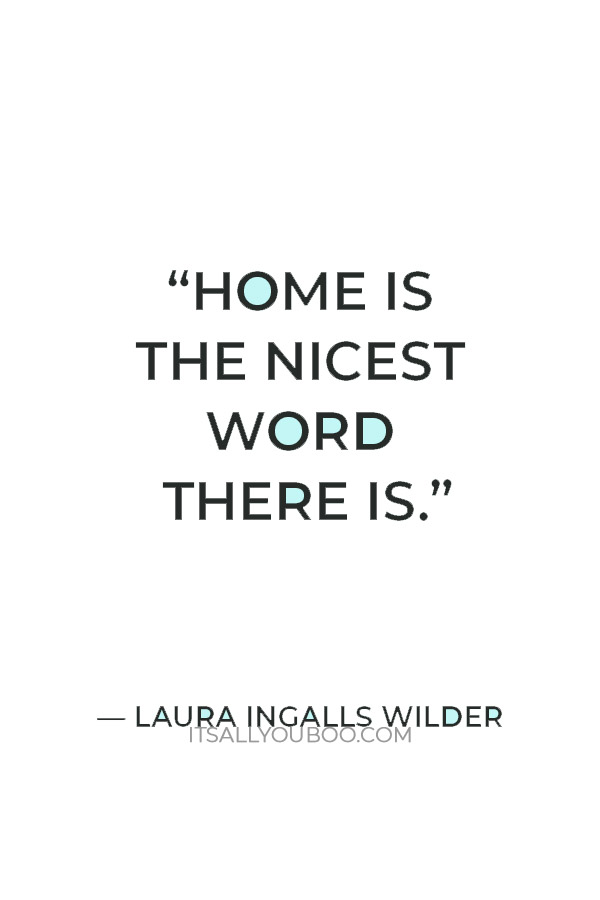
#1. Renting Has Less Upfront Cost
When comparing the cost of owning a home vs. renting, there are many aspects to consider. Personal finance is a big reason many people prefer an apartment over a house. With leasing, the upfront costs are much lower than purchasing a home.
You will likely need a large sum of money for a down payment for a home. With renting, no such down payment is required. Though you may have to pay the first and last month’s rent upon your arrival, the cost is nowhere near the amount needed for a home.
Some rental properties may also require a security deposit. But, if you have not caused any damage to your apartment, you will likely receive it back once you have moved out.
#2. Insurance Costs Are Lower When Renting
Insurance is an important asset to have if you live in a rental. Many people may not consider it, but having coverage protection can save you from having to replace all your belongings in the event of a disaster. You also don’t have to carry private mortgage insurance when renting.
Renters’ insurance is typically cheaper than homeowners’ insurance since less coverage is required. You don’t own the building you live in, so the only protection you’ll need is your belongings. If you want to know how to get a renters insurance policy fast, consider contacting an insurance agent or comparing prices online.
Perhaps you can invest your savings into a life insurance policy?
👉🏽 RELATED POST: Shopping List for a New House
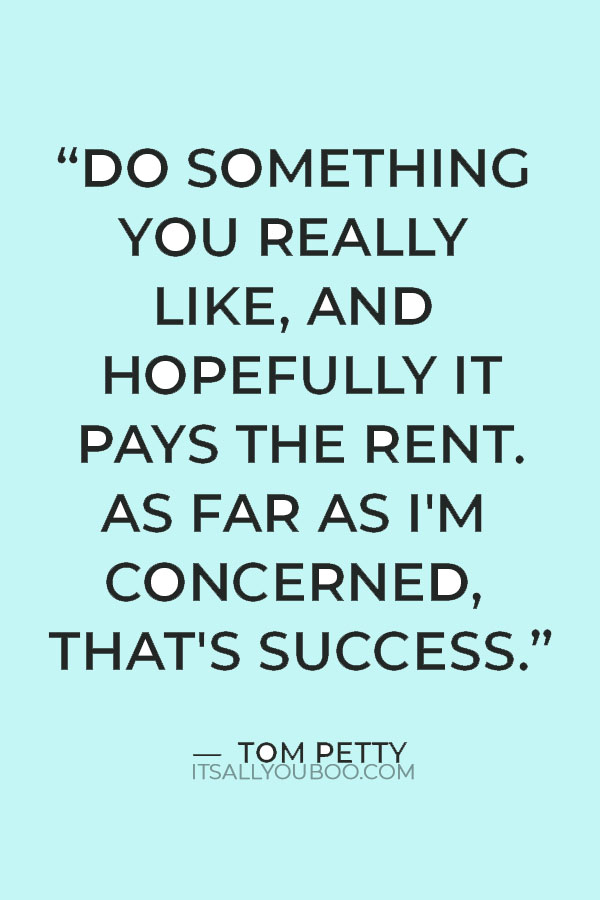
#3. Maintenance is Covered when Renting
If you’re not handy or don’t have the money to pay someone for repairs and maintenance, renting an apartment can be a great option. When renting, you won’t have to worry about taking care of things that go wrong in your apartment.
Your building management will have someone on hand to fix any issues that may arise while you live there. Not only is this typically more convenient than waiting for a hired repair company, but it also won’t cost you a penny.
#4. Apartments Offer Amenities
Many apartment complexes offer a wide variety of amenities for their residents. Luxuries such as swimming pools, gyms, and party rooms are often available for apartment guests, with the cost already included in their rent.
These amenities can become quite expensive to pay for separately when not renting. You may also have to drive to different locations to access them, costing you time and gas. Renting offers the convenience of having these facilities close and free of charge.
👉🏽 RELATED POST: Insurance 101

Cons of Renting an Apartment
While there are many advantages to consider, renting does have its downside. Some aspects of renting might not appeal to people looking for a particular type of lifestyle.
#1. Renting Could Limit Personal Style
When renting, you are limited in how much you can reflect yourself in your space. While there are some renter-friendly upgrades you can make, you are still much more limited than you would be in a home you own.
You won’t be able to paint, renovate, or update anything in your apartment due to your rental agreement. If you don’t like the countertops in your apartment’s kitchen, there isn’t much you can do to change them.
#2. Pets Might Not Be Welcomed When Renting
If you’re an animal lover, you may be upset to find your apartment complex doesn’t welcome pets or has a limit on how many you may have. The number of animals you can have may not be the only stipulation your landlord includes, either.
You may also be limited on the size or breed of your dog. Many apartment complexes refuse certain breeds or have a maximum weight limit for your dog. They could also charge you a pet fee each month on top of your regular rent.
👉🏽 RELATED POST: How To Save for a House While Renting
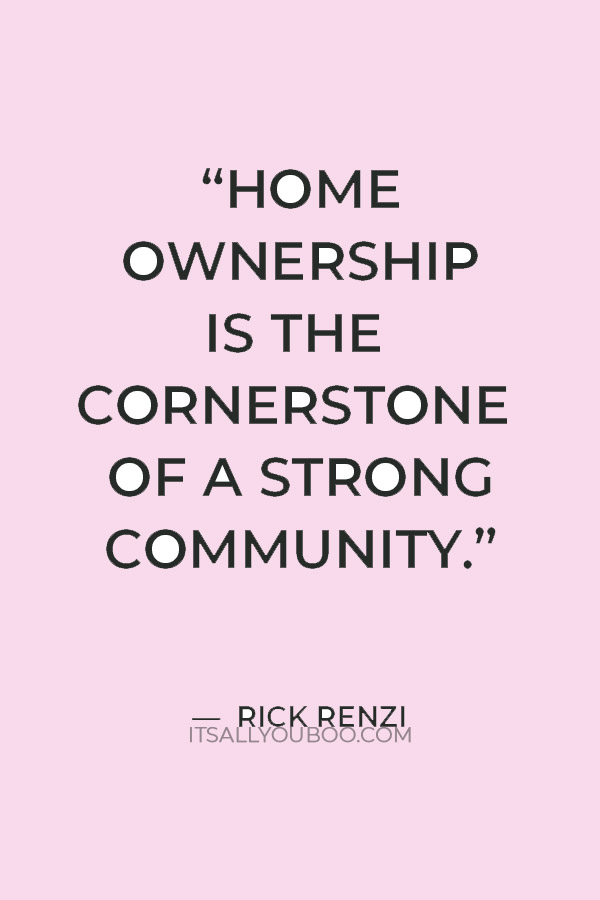
#3. Choosing to Rent Won’t Gain Equity
Though apartments offer a lot of conveniences, they can’t build equity while you reside there. When you own a home, that property is considered an asset. Since you have no ownership of your apartment, you won’t gain anything from it when you decide to move.
Essentially you will be paying monthly toward your rent, but you gain no return on the property to put toward your following living location. Building equity allowed you to later apply for a home equity loan, which could have more favorable rates than personal loans.
#4. You Are Subjected to Landlord’s Decisions When Renting
Landlords can change their minds when they choose. While renting, your landlord sets the rules and rent prices. Typically, this will have to be brought up before signing your lease agreement or renewing it, but the notice is not always convenient.
If you were planning on renewing your lease next month and suddenly find yourself with a new, higher rent cost, you could be stuck determining if you’ll be able to afford the price or find a new place to live. Your landlord makes the final decision, and it will be up to you to decide what to do from there.
Pros of Owning a Home
Many people dream of owning their own homes. But with current prices skyrocketing, you may be left wondering if home buying is an option.
The good news? There are still plenty of positive reasons to buy a home. A real estate agent would be a great place to start if you have questions! They will know about any first-time home buyer tips and incentives offered in your area.
👉🏽 RELATED POST: 5 Home Shopping Tips
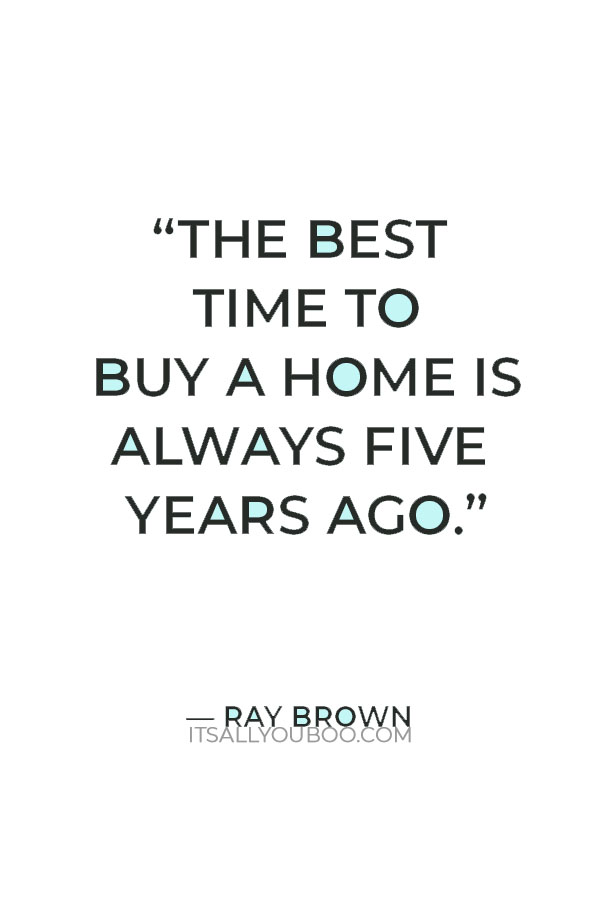
#1. Buying a Home Allows for Complete Freedom
When you own property, you have the freedom to do with it whatever you choose. You can purchase a home and completely gut it to start from scratch. It can also lead to financial freedom.
You can paint the walls, update your kitchen, plant landscaping, and do anything else you choose. The home is yours, and the only restrictions will likely be your renovation budget.
#2. Your Home Builds You Equity
Home buying is an investment, and in the long run, it typically pays off. If you have lived in your home for a long time, you will likely receive a large sum of money to put toward your next home purchase or even put it into your emergency fund if you choose.
This money comes from the difference in the personal loan amount you owe on the home and your home’s sale price; this is the home equity. The profit will depend on how much you have paid off or how much the value of your home has increased.
#3. Owning a Home Means a Fixed Payment Each Month
You will likely purchase your home through a fixed-rate mortgage loan. The benefit of this loan is that you will never have to pay more than your agreed-upon monthly payment. Though other aspects, such as property taxes, may increase from time to time, your mortgage payment and mortgage interest won’t change.
You’ll often find these set monthly payments make owning a home cheaper than renting. Because rent prices will likely continue to increase, a locked-in mortgage rate can save you money over time.
👉🏽 RELATED POST: Financial Goals for Homeowners
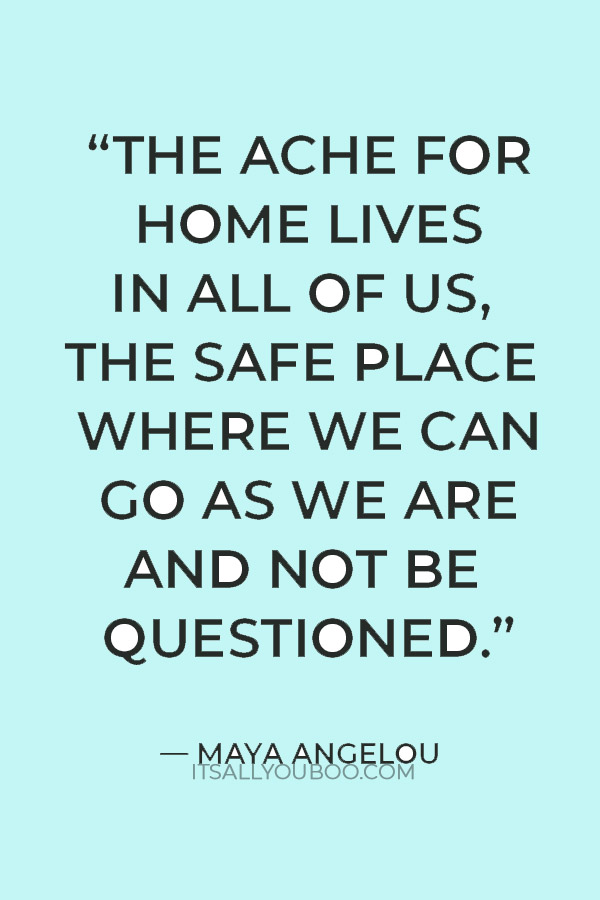
#4. A Home Offers Outdoor Space
If you enjoy spending time outside, entertaining, or owning pets, a yard may be something you prefer your living space to have. When renting, apartment buildings typically offer a small patio, but you won’t find a personal yard.
Owning a home offers you outdoor space to use as you choose. Building a fence to create a nice yard for your children or pets, adding an outdoor entertainment area, or even planting a garden are all achievable if you own your home.
Cons of Owning a Home
Though the pros are fantastic when considering purchasing, there are some disadvantages to owning a home. Some aspects of homeownership may be unappealing to certain people.
#1. You Take Full Responsibility When Owning a Home
While renting offers the luxury of a quick call to maintenance when you have a problem, owning a home means those responsibilities fall to you. If something breaks, it is on you to fix it or find someone who can. You will also have to pay for the repair costs.
Home repairs can happen unexpectedly and may become very expensive, depending on the damage. If you can’t afford to pay them or can’t find a timely repair professional, you could be waiting a long time for your issue to be resolved.
#2. Owning a Home Requires Upfront Costs
To purchase a home, you will need to pay the upfront costs from a savings account. These expenses may include your down payment, closing costs, home inspection, and earnest money.
These costs can add up quickly, costing you a large sum of money before you can even move into your home. If you don’t have the funds for these expenses, you may not be able to follow through with your purchase.
#3. Owning a Home Leads to Higher Insurance Rates
When comparing renting vs. buying pros and cons, insurance coverage is undoubtedly a con for homeowners. While renters can expect to pay less for their coverage, those who own property will pay more from home insurance.
Since insurance is based on the value of what you own, your rates will be more due to higher-valued assets. Your home, its land, and your belongings will cost you an increased premium to cover them in the event of a disaster.
👉🏽 RELATED POST: How to Feel Safe at Home
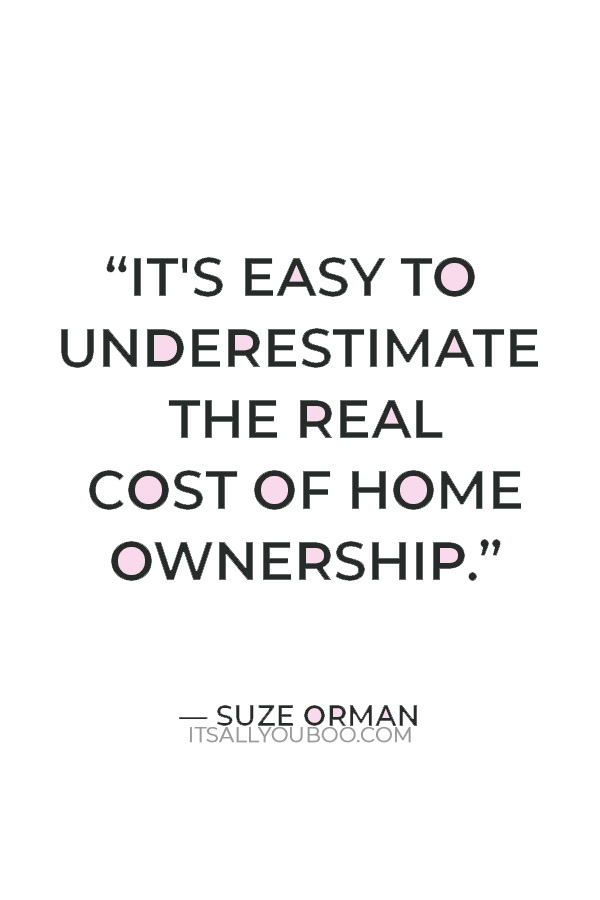
#4. You are Locked in when Purchasing a Home
For someone who frequently enjoys moving to new places, the commitment to a home may not be ideal. Though no one can force you to stay in your home for a certain amount of time, it’s likely once you purchase, you won’t want to leave again for a while. Unlike an apartment, buying a home takes a much larger dedication and is more time-consuming.
Because of the loans, investment, and process involved in purchasing a house, it becomes much harder to move. You have to sell your current home, find another, come up with more upfront costs, and find new funding.
Deciding Between Buying a Home vs. Renting an Apartment
When you are torn between buying a home vs. renting an apartment, there are many factors to consider. For some, a home may be the better choice. However, for others, an apartment might better suit their needs.
Making the decision comes down to lifestyle preferences, finances, and commitment. Determining which factors are most important to you can help you decide what is right if it is worth buying instead of renting or if short-term rental agreements may be better.
Get Your Simple Budget Spreadsheet
Budgeting to help you decide between buying a home vs renting an apartment? With the Simple Budget Spreadsheet, you’ll be able to track your spending and savings as you save for a home while renting. It’s easy to use and compatible with Google Docs and Microsoft Excel.
Whether you’re contemplating purchasing your first home or renting your first apartment, these tips can help guide you. When you’re ready to move forward reach out to local real estate agents or real estate agent websites to preview the market.
You have to do your research! Perhaps money market accounts are a better investment for your money. Seek professional advice from your financial advisors.
Write down your pros and cons for either decision and remember to decide based on your budget not just your feelings about it. Know the facts, the interest rates, and the financial reality of either choice and then decide.
In the end, the decision is yours to make. The timing has to be right for you.

Are you considering buying a home vs renting an apartment?

More About Guest Contributor
Alexandra Arcand writes and researches for the insurance comparison site, Clearsurance.com. She recently purchased a home and understands the importance of weighing options before deciding.
Last Updated on January 6, 2025






